2014英语中考一轮复习八年级上学期学案
- 格式:doc
- 大小:166.00 KB
- 文档页数:12
![中考英语人教版一轮复习导学案+第五讲+八年级(上)Units+1~3[1]](https://uimg.taocdn.com/959cd9a7f121dd36a32d82d5.webp)
第五讲八年级(上)Units1~3(一、根据句意及首字母或汉语提示,填入正确的单词。
1.Could you give me something to eat?I'm very hungry.2.It's going to rain.Please take an umbrella with you.3.Tina dislikes playing basketball,but she likes playing soccer.4.I bought something for my friends,but nothing for myself.5.There are some differences between Chinese culture and Japanese culture.6.Some old men enjoy reading magazines(杂志)in the park every morning.7.Mike isoutgoing(外向的). He likes to talk with others.8.Liang Bo won first prize in the 2012 Voice of China competition(比赛).9.I can't see the thingsclearly(清楚地)in the dark.10.If you want to get moreinformation(信息)about our school,you can visit our school's website.二、用括号内所给单词的适当形式填空。
11.I really enjoyed walking (walk) around the town.12.We were surprised (surprise) that ninety percent of the m use the Internet every day.13.I think my mother is smarter (smart) than my father.14.My friend David is more_hard-working (hard-work) than me,but I am funnier (funny) than him.15.They go camping (camp) in the country once a term.三、根据汉语完成句子,每空一词。
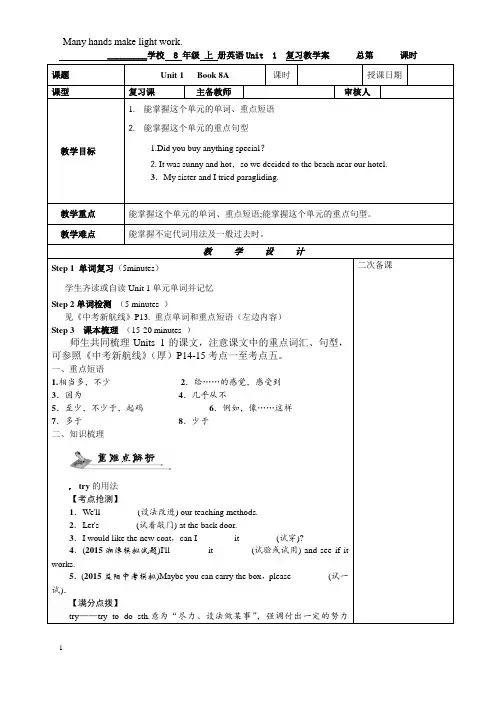
_________学校 8 年级上册英语Unit 1 复习教学案总第课时课题Unit 1 Book 8A 课时授课日期课型复习课主备教师审核人教学目标1.能掌握这个单元的单词、重点短语2.能掌握这个单元的重点句型1.Did you buy anything special?2.It was sunny and hot,so we decided to the beach near our hotel.3.My sister and I tried paragliding.教学重点能掌握这个单元的单词、重点短语;能掌握这个单元的重点句型。
教学难点能掌握不定代词用法及一般过去时。
教学设计Step 1 单词复习(5minutes)学生齐读或自读Unit 1单元单词并记忆Step 2单词检测(5 minutes )见《中考新航线》P13. 重点单词和重点短语(左边内容)Step 3 课本梳理(15-20 minutes )师生共同梳理Units 1的课文,注意课文中的重点词汇、句型,可参照《中考新航线》(厚)P14-15考点一至考点五。
一、重点短语1.相当多,不少____________ 2.给……的感觉,感受到____________3.因为____________ 4.几乎从不____________5.至少,不少于,起码____________ 6.例如,像……这样____________7.多于____________ 8.少于____________二、知识梳理try的用法【考点抢测】1.We'll ________(设法改进) our teaching methods.2.Let's ________(试着敲门) at the back door.3.I would like the new coat,can I ________it ________(试穿)?4.(2015湘潭模拟试题)I'll ________it ________(试验或试用) and see if itworks.5.(2015益阳中考模拟)Maybe you can carry the box,please ________(试一试).【满分点拨】try——try to do sth.意为“尽力、设法做某事”,强调付出一定的努力二次备课—try doing sth.意为“尝试做某事”,但不一定付出很大努力—(1)try构成的其他搭配:try on试穿try one's best尽最大努力(2)try作名词,意为“尝试”,have a try试一试enough的用法【考点抢测】6.That bicycle is ________(足够大) for me.7.In the old days,lots of people didn't have ______(足够的食物) to eat and money to send their children to school.8.(2015常德中考模拟)Five people will be quite ________(足够完成) the work.【满分点拨】enough的用法enough作形容词时,置于名词前、后均可作副词时,置于所修饰的形容词、副词之后【巧学妙记】enough在句中的位置修饰名词很自由,可以前来也可后;若是修饰形或副,一定后置要记住。
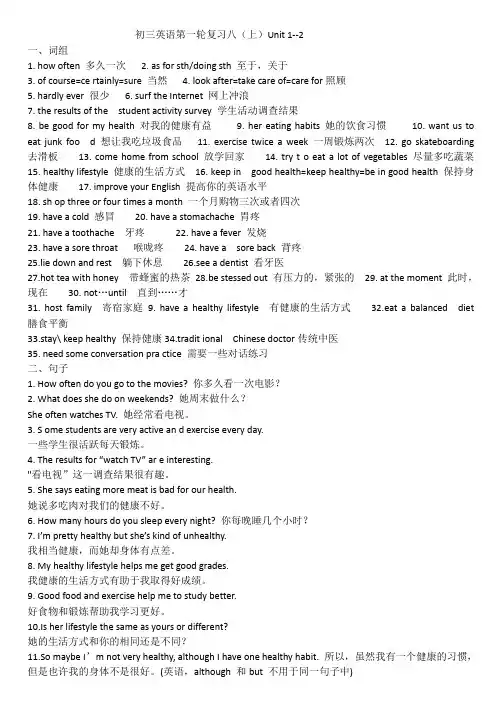
初三英语第一轮复习八(上)Unit 1--2一、词组1. how often 多久一次2. as for sth/doing sth 至于,关于3. of course=ce rtainly=sure 当然4. look after=take care of=care for照顾5. hardly ever 很少6. surf the Internet 网上冲浪7. the results of the student activity survey 学生活动调查结果8. be good for my health 对我的健康有益9. her eating habits 她的饮食习惯10. want us to eat junk foo d 想让我吃垃圾食品11. exercise twice a week 一周锻炼两次12. go skateboarding 去滑板13. come home from school 放学回家14. try t o eat a lot of vegetables 尽量多吃蔬菜15. healthy lifestyle 健康的生活方式16. keep in good health=keep healthy=be in good health 保持身体健康17. improve your English 提高你的英语水平18. sh op three or four times a month 一个月购物三次或者四次19. have a cold 感冒20. have a stomachache 胃疼21. have a toothache 牙疼22. have a fever 发烧23. have a sore throat 喉咙疼24. have a sore back 背疼25.lie down and rest 躺下休息26.see a dentist 看牙医27.hot tea with honey 带蜂蜜的热茶28.be stessed out 有压力的,紧张的29. at the moment 此时,现在30. not…until 直到……才31. host family 寄宿家庭9. have a healthy lifestyle 有健康的生活方式32.eat a balanced diet 膳食平衡33.stay\ keep healthy 保持健康34.tradit ional Chinese doctor传统中医35. need some conversation pra ctice 需要一些对话练习二、句子1. How often do you go to the movies? 你多久看一次电影?2. What does she do on weekends? 她周末做什么?She often watches TV. 她经常看电视。
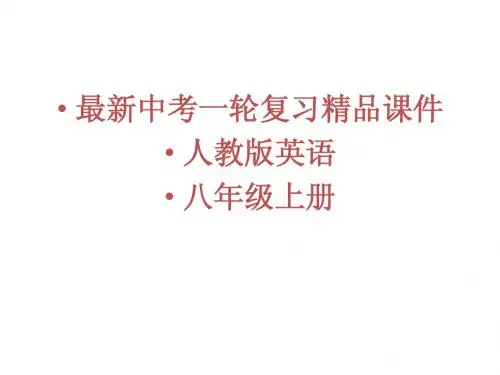
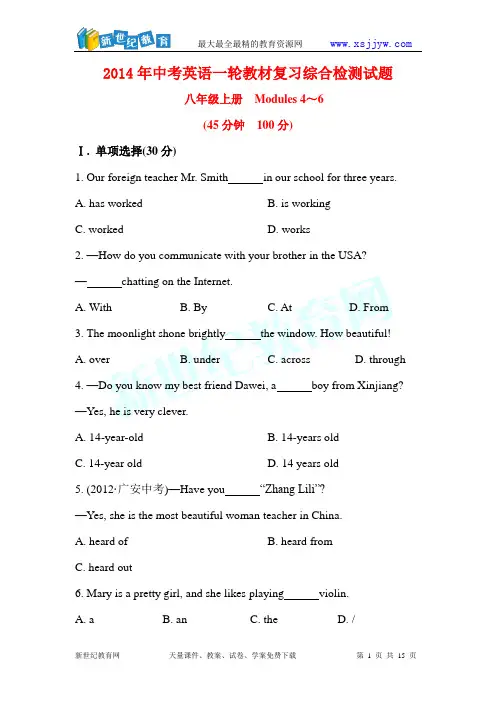
2014年中考英语一轮教材复习综合检测试题八年级上册Modules 4~6(45分钟100分)Ⅰ. 单项选择(30分)1. Our foreign teacher Mr. Smith in our school for three years.A. has workedB. is workingC. workedD. works2. —How do you communicate with your brother in the USA? —chatting on the Internet.A. WithB. ByC. AtD. From3. The moonlight shone brightly the window. How beautiful!A. overB. underC. acrossD. through4. —Do you know my best friend Dawei, a boy from Xinjiang? —Yes, he is very clever.A. 14-year-oldB. 14-years oldC. 14-year oldD. 14 years old5. (2012·广安中考)—Have you“Zhang Lili”?—Yes, she is the most beautiful woman teacher in China.A. heard ofB. heard fromC. heard out6. Mary is a pretty girl, and she likes playing violin.A. aB. anC. theD. /7. All the students are talking and laughing in the classroom after class and it’s.A. noisyB. lonelyC. quietD. strict8. —What do you think of the book Harry Potter?—I like it very much. It’s interesting exciting.A. not; butB. not only; but alsoC. either; orD. neither; nor9. —Why didn’t you go to the cinema?—Because I had to my little brother at home.A. look outB. look upC. look forD. look after10. —What were you doing this time yesterday?—I on the grass and drawing a picture.A. sitB. satC. am sittingD. was sitting11. We didn’t start our meeting everybody arrived.A. sinceB. ifC. whenD. until12. There is nothing new in the newspaper, ?A. isn’t itB. is itC. isn’t thereD. is there13. If you find there, call me right away, please.A. strange somethingB. something strangeC. anything strangeD. strange anything14. The film since half an hour ago, so I missed the beginning.A. has begunB. has been onC. beganD. was on15. There was a heavy rain last night! I was doing my homework. Suddenly, all the lights in my house.A. went offB. turned offC. took offD. got offⅡ. 完形填空(10分)YoYo Ma was born11955 to Chinese parents living in Paris. He began to study the cello with his father at four. A year later, when he was2years old, he gave his first concert. The family soon3to New York, America. Later he joined Julliard School, a school4gifted musicians. He went to Harvard University 5music and graduated in 1976.YoYo soon became famous6his concerts. He always tries to play the cello with music from different countries like Brazil and China. He wrote7for the film Crouching Tiger, Hidden Dragon.It sounds 8.YoYo is sometimes forgetful. He once9his cello in a taxi in New York. He was really10because it’s worth $2, 000, 000. The taxi driver took it to a police station. YoYo was very thankful.1. A. in B. at C. on D. for2. A. four B. five C. six D. seven3. A. decided B. worked C. moved D. lived4. A. for B. as C. by D. with5. A. studied B. to studyC. studyingD. studies6. A. as B. to C. for D. like7. A. a story B. an articleC. musicD. a poem8. A. brilliant B. brilliantly C. well D. bad9. A. forgot B. rememberedC. missedD. left10. A. excited B. worried C. lonely D. bored Ⅲ. 阅读理解(10分)A long time ago there lived a king and a queen, and first they hadno children. And finally the queen had a little girl who was so pretty. They were very happy and ordered a great dinner.Most wise women came to give magic gifts to the baby. Suddenly the thirteenth came in. She was angry because the king didn’t invite her to dinner. She cried with a loud voice, “The king’s daughter will prick(刺痛)herself with a spindle(纺锤), and fall down dead in her fifteenth year. ”They were all shocked, but the twelfth, whose good wish stillremained unspoken, said, “She won’t be dead, but a deep sleep of a hundred years, into which the prince will fall. ”It happened when the princess was fifteen years old. One day, she reached a small room and saw an old woman with a spindle, busily spinning her flax(纺织品). “How wonderful! ”the girl took the spindle and wanted to spin, too. But when she picked her finger with the spindle, she fell down and lay in a deep sleep.Then a hundred years passed, and the day had come when the princess was awake again. A king’s son came and opened the door into the small room, where the king’s daughter was sleeping. There she lay, so beautiful that he could not turn his eyes away, and he stooped down and gave her a kiss. But as soon as he kissed her, she opened her eyes and awoke and looked at him quite sweetly.1. Why was the thirteenth wise woman very angry?A. Because she had no food to eat.B. Because the king didn’t invite her to dinner.C. Because she had no children.D. Because she had no gifts to the girl.2. The un derlined word “shocked” in the passage means in Chinese.A. 摇动的B. 震惊的C. 冲击的D. 过度的3. What did the princess see the old woman doing in the small room?A. Sleeping.B. Spinning her flax.C. Washing.D. Having dinner.4. How many years did the prince sleep in the story?A. 100 years.B. 150 years.C. 200 years.D. 250 years.5. What do you think of the thirteenth wise woman in the story?A. She was friendly.B. She was evil.C. She was boring.D. She was successful.Ⅳ. 词汇运用(10分)(Ⅰ)根据句意及首字母提示完成单词。
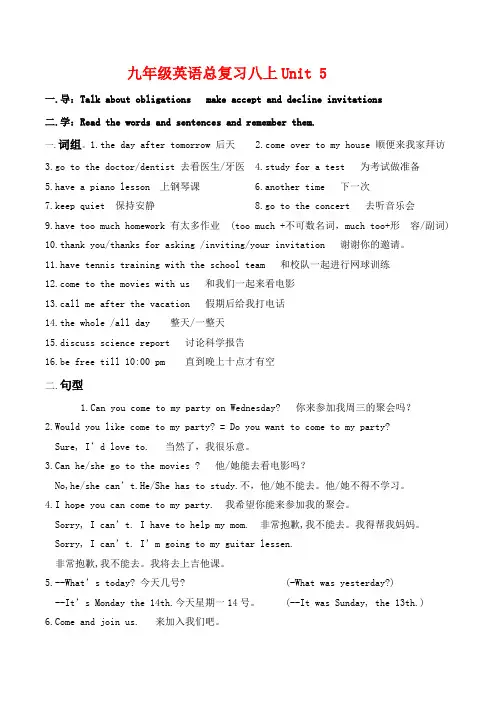
九年级英语总复习八上Unit 5一.导:Talk about obligations make accept and decline invitations二.学:Read the words and sentences and remember them.一.词组。
1.the day after tomorrow 后天 e over to my house 顺便来我家拜访3.go to the doctor/dentist 去看医生/牙医4.study for a test 为考试做准备5.have a piano lesson 上钢琴课6.another time 下一次7.keep quiet 保持安静 8.go to the concert 去听音乐会9.have too much homework 有太多作业 (too much +不可数名词,much too+形容/副词)10.thank you/thanks for asking /inviting/your invitation 谢谢你的邀请。
11.have tennis training with the school team 和校队一起进行网球训练e to the movies with us 和我们一起来看电影13.call me after the vacation 假期后给我打电话14.the whole /all day 整天/一整天15.discuss science report 讨论科学报告16.be free till 10:00 pm 直到晚上十点才有空二.句型1.Can you come to my party on Wednesday? 你来参加我周三的聚会吗?2.Would you like come to my party? = Do you want to come to my party?Sure, I’d love to.当然了,我很乐意。
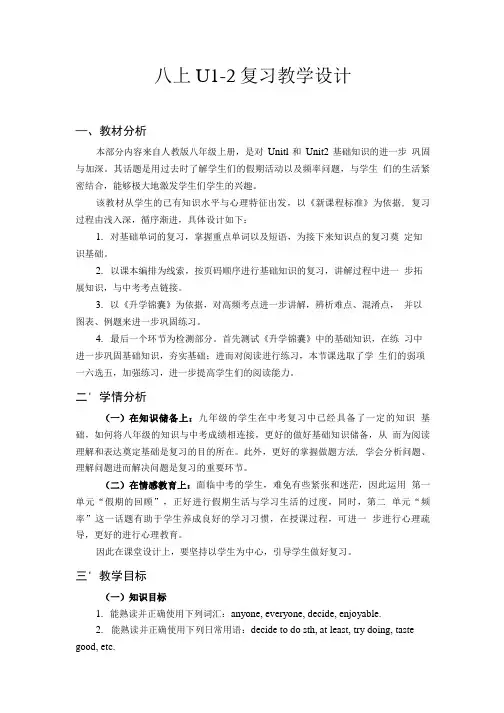
八上U1-2复习教学设计—、教材分析本部分内容来自人教版八年级上册,是对Unitl和Unit2基础知识的进一步巩固与加深。
其话题是用过去时了解学生们的假期活动以及频率问题,与学生们的生活紧密结合,能够极大地激发学生们学生的兴趣。
该教材从学生的已有知识水平与心理特征出发,以《新课程标准》为依据, 复习过程由浅入深,循序渐进,具体设计如下:1.对基础单词的复习,掌握重点单词以及短语,为接下来知识点的复习奠定知识基础。
2.以课本编排为线索,按页码顺序进行基础知识的复习,讲解过程中进一步拓展知识,与中考考点链接。
3.以《升学锦囊》为依据,对高频考点进一步讲解,辨析难点、混淆点,并以图表、例题来进一步巩固练习。
4.最后一个环节为检测部分。
首先测试《升学锦囊》中的基础知识,在练习中进一步巩固基础知识,夯实基础;进而对阅读进行练习,本节课选取了学生们的弱项一六选五,加强练习,进一步提高学生们的阅读能力。
二' 学情分析(一)在知识储备上:九年级的学生在中考复习中已经具备了一定的知识基础,如何将八年级的知识与中考成绩相连接,更好的做好基础知识储备,从而为阅读理解和表达奠定基础是复习的目的所在。
此外,更好的掌握做题方法, 学会分析问题、理解问题进而解决问题是复习的重要环节。
(二)在情感教育上:面临中考的学生,难免有些紧张和迷茫,因此运用第一单元“假期的回顾”,正好进行假期生活与学习生活的过度,同时,第二单元“频率”这一话题有助于学生养成良好的学习习惯,在授课过程,可进一步进行心理疏导,更好的进行心理教育。
因此在课堂设计上,要坚持以学生为中心,引导学生做好复习。
三' 教学目标(一)知识目标1.能熟读并正确使用下列词汇:anyone, everyone, decide, enjoyable.2.能熟读并正确使用下列日常用语:decide to do sth, at least, try doing, taste good, etc.3.掌握常用句型:Where did you go on vacation?How often do you exercise?(二)能力目标通过复习基础知识,夯实基础,为阅读奠定知识基础。
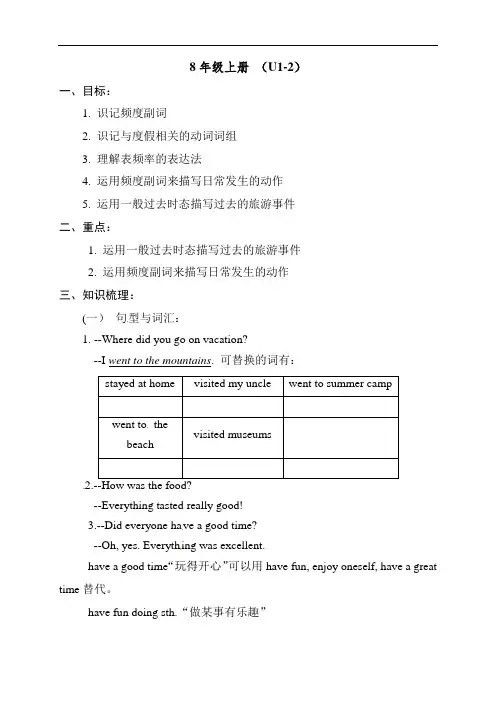
8年级上册(U1-2)一、目标:1. 识记频度副词2. 识记与度假相关的动词词组3. 理解表频率的表达法4. 运用频度副词来描写日常发生的动作5. 运用一般过去时态描写过去的旅游事件二、重点:1. 运用一般过去时态描写过去的旅游事件2. 运用频度副词来描写日常发生的动作三、知识梳理:(一)句型与词汇:1. --Where did you go on vacation?--I went to the mountains. 可替换的词有:stayed at home visited my uncle went to summer campwent to thevisited museumsbeach2.--How was the food?--Everything tasted really good!3.--Did everyone have a good time?--Oh, yes. Everything was excellent.have a good time“玩得开心”可以用have fun, enjoy oneself, have a great time替代。
have fun doing sth.“做某事有乐趣”I had great fun playing cards with them.我和他们玩纸牌玩得非常高兴.4. --How often do you go to the movies?--I go to the movies maybe once a month.词组用法how often 用来提问某动作或状态发生的频率,对“一段时间内发生了几次活动”always, usually,often, sometimes, hardly ever, never或every day, once a week, twice a day, three times a month等表示频度的词或短语)提问时用。
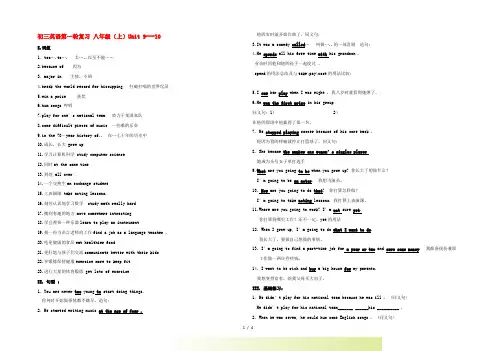
初三英语第一轮复习八年级(上)Unit 9---10I.词组1. too….to…. 太…..以至不能……2.because of 因为3. major in 主修,专研4.break the world record for hiccupping 打破打嗝的世界纪录5.win a prize 获奖6.hum songs 哼唱7.play for one’s national team 效力于某国家队8.some difficult pieces of music 一些难的乐章9.in the 70-year history of.. 在…七十年的历史中10.成长,长大 grow up11.学习计算机科学 study computer science12.同时at the same time13.到处 all over14.一个交换生an exchange student15.上表演课 take acting lessons.16.刻苦认真地学习数学 study math really hard17.搬到有趣的地方 move somewhere intresting18.学会弹奏一种乐器learn to play an instrument19.找一份当语言老师的工作find a job as a language teacher .20.吃更健康的食品eat healthier food21.更好地与孩子们交流communicate better with their kids22.多锻炼保持健康exercise more to keep fit23.进行大量的体育锻炼 get lots of exerciseII. 句型 :1. You are never too young to start doing things.你何时开始做事情都不嫌早。
造句:2. He started writing music at the age of four .他四岁时就开始作曲了。
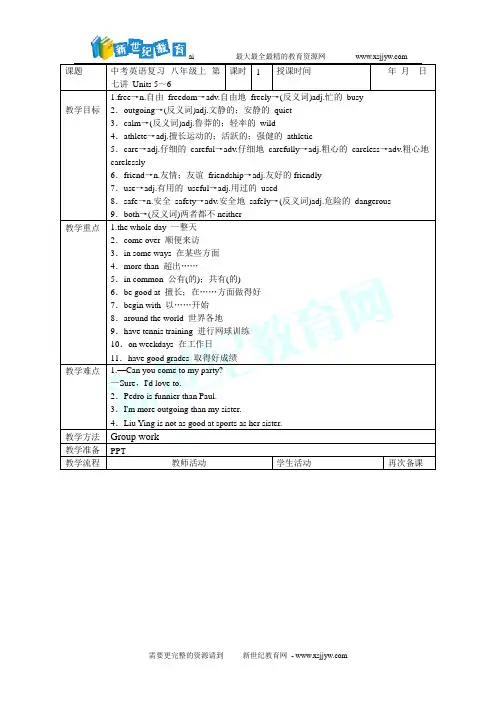
课题中考英语复习八年级上第七讲Units 5~6课时 1 授课时间年月日教学目标1.free→n.自由freedom→adv.自由地freely→(反义词)adj.忙的busy2.outgoing→(反义词)adj.文静的;安静的quiet3.calm→(反义词)adj.鲁莽的;轻率的wild4.athlete→adj.擅长运动的;活跃的;强健的athletic5.care→adj.仔细的careful→adv.仔细地carefully→adj.粗心的careless→adv.粗心地carelessly6.friend→n.友情;友谊friendship→adj.友好的friendly7.use→adj.有用的useful→adj.用过的used8.safe→n.安全safety→adv.安全地safely→(反义词)adj.危险的dangerous 9.both→(反义词)两者都不neither教学重点 1.the whole day 一整天2.come over 顺便来访3.in some ways 在某些方面4.more than 超出……5.in common 公有(的);共有(的)6.be good at 擅长;在……方面做得好7.begin with 以……开始8.around the world 世界各地9.have tennis training 进行网球训练10.on weekdays 在工作日11.have good grades 取得好成绩教学难点 1.—Can you come to my party?—Sure,I'd love to.2.Pedro is funnier than Paul.3.I'm more outgoing than my sister.4.Liu Ying is not as good at sports as her sister.教学方法Group work教学准备PPT教学流程教师活动学生活动再次备课1.Can_you come to my party?你能来参加我的聚会吗?(Unit 5)Can you...?意为“你能……吗?”表示客气地请求某人做某事。
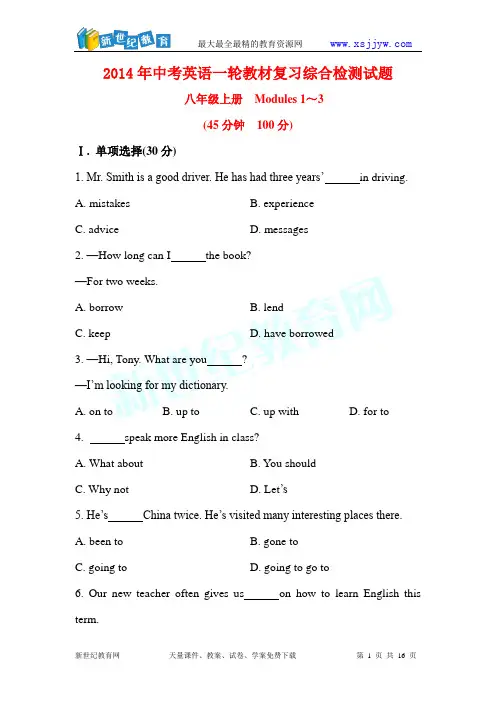
2014年中考英语一轮教材复习综合检测试题八年级上册Modules 1~3(45分钟100分)Ⅰ. 单项选择(30分)1. Mr. Smith is a good driver. He has had three years’in driving.A. mistakesB. experienceC. adviceD. messages2. —How long can I the book?—For two weeks.A. borrowB. lendC. keepD. have borrowed3. —Hi, Tony. What are you?—I’m looking for my dictionary.A. on toB. up toC. up withD. for to4. speak more English in class?A. What aboutB. You shouldC. Why notD. Let’s5. He’s China twice. He’s visited many interesting places there.A. been toB. gone toC. going toD. going to go to6. Our new teacher often gives us on how to learn English this term.A. some advicesB. an adviceC. some adviceD. a piece of advices7. I a copy of Yi Zhongtian’s book yet. I might buy one tomorrow.A. hadn’t boughtB. don’t buyC. won’t buyD. haven’t bought8. —Have you finished your work?—Yes, I have. I’ve finished it.A. yet; alreadyB. already; yetC. just; alreadyD. already; just9. —What do you think of Harry Potter?—I’ve no idea. Because I never it.A. do; readB. did; readC. have; seenD. have; read10. The boy doesn’t have any close friends here, so he feels from time to time.A. aloneB. happyC. lonelyD. proud11. My parents enjoy for a walk after supper.A. goB. goesC. to goD. going12. Remember off the lights when you leave the classroom.A. turnB. to turnC. turningD. turns13. It’s very dangerous a car at a very high speed.A. driveB. to driveC. drivingD. drives14. Tom prefers rather than basketball.A. watching; playB. to watch; playC. watch; playD. watching; playing15. My teacher has some foreign pen friends, but of them comes from Japan.A. bothB. noneC. eitherD. neitherⅡ. 完形填空(10分)HITTING the water with almost superman’s love and strength, Sun Yang has made history after his excellent performance at the London Olympic Games.The1Sun became the first Chinese man to wingold in swimming. He took home2medals in total, two golds, one silver and one bronze.Sun said his success was down to hard work. For years he has made it a rule320km every day. “W hen I trained in Australia, it was winter. 4the weather was cold and I was tired, I started training at 4: 30 am, ”he said. The post-1990 athlete is popular not only because of his victory in London, but also his sportsmanship.His nickname online is “Sun Mengmeng”5in Chinese refers to his innocent(天真的)appearance and charming(可爱的)personality, Sun has gained more than 10 million followers on Sina Weibo. His first message about his trip back to his hometown, Hangzhou, after theOlympics, received6repli es. “The high-speed train on my way home has been blocked(阻止)for three hours due(由于)to Typhoon Haikui, ”it said. “Is7possible for me to arrive home tonight? ”Some Weibo users even visited his page to give funny replies, such as “Why not swim home? ”Sun may dream of matching his idol(偶像), American Michael Phelps, who822 Olympic medals. But as a third-year student in Zhejiang University, he says he has a long way9.“Sun works hard in class. His diligence(勤奋)10the choices of a new generation of Chinese athletes, who are making more time for their education and not just focusing on sport, ”said his professor, Zheng Fang.1. A. 20 years old B. 20 year oldC. 20-year-oldD. 20-years-old2. A. two B. three C. four D. one3. A. swimming B. to swimC. swimD. swims4. A. Although B. Because C. When D. If5. A. which B. whose C. who D. where6. A. thousand of B. thousands ofC. thousandsD. million of7. A. that B. thisC. itD. my plan8. A. win B. winsC. have wonD. has won9. A. going B. to go C. will go D. goes10. A. says B. talks C. explains D. showsⅢ. 阅读理解(10分)On June 14, 2012, Liu Yang’s dream came true—shebecame the first Chinese woman astronaut(宇航员).She was sent to space with two other Chineseastronauts Jing Haipeng and Liu Wang in Shenzhou Ⅸspacecraft(飞船). They were going to meet with Tiangong-1. At the same time, they would be doing many important experiments in space.Liu Yang was born in 1978. She was interested in flying when she was young. She worked hard at her studies in high school and entered an aviation(航空)school. She then joined the PLA Air Force(空军)in 1997. After flying safely for 1, 680 hours, she was chosen to be an astronaut in 2010.After two years of training, Liu Yang learned the skills of an astronaut and the ability to live in the space environment. Although she was busy training hard, she still found time to do things that gave her pleasure. Besides cooking, she loves reading, especially novels andhistory.“I have full confidence, ”Liu Yang said before taking off. “There are many foreign women astronauts who have been into space. They do just as well as men in space. ”1. When she was years old, she was sent to the space.A. 33B. 34C. 35D. 322. Liu Yang was confident because.A. she was the first Chinese woman astronautB. she believed that women could do as well as men in spaceC. other foreign women astronauts have already been into spaceD. she was interested in many things3. She was fond of after work according to the passage.A. making dishesB. playing sportsC. flyingD. writing novels4. Which is NOT true according to the passage?A. The astronauts were going to do experiments in space.B. Liu Yang was sent to space with other foreign astronauts.C. After high school, Liu Yang studied in an aviation school.D. Tiangong-1 was in space waiting for Shenzhou Ⅸto come.5. What can be the best title of the passage?A. Shenzhou ⅨMet with Tiangong-1 in SpaceB. Liu Yang Had a Great DreamC. How to Live in the Space EnvironmentD. Liu Yang Became the First Chinese Woman AstronautⅣ. 词汇运用(10分)(Ⅰ)根据句意及汉语提示完成单词。
第六讲 八年级(上)Units 4~6重点词汇1.ticket(n .)票;入场券票;入场券 2.fres h(adj .)新鲜的新鲜的 3.service(n .)接待;服务接待;服务4.menu(n .)菜单菜单5.creative(adj .)有创造力的;创造性的创造性的 6.prize(n .)奖金奖金 7.poor(adj .)贫穷的;清贫的贫穷的;清贫的 8.news(n .)新闻;新闻节目新闻;新闻节目 9.expect(v .)预料;期待预料;期待 10.culture(n .)文化;文明文化;文明 11.famous(adj .)著名的;出名的12.medicine(n .)药;医学药;医学13.engineer(n .)工程师工程师14.article(n .)文章;论文文章;论文 15.promis e(v .)许诺;承诺许诺;承诺 16.improve(v .)改进;改善改进;改善 17.hobby(n .)业余爱好业余爱好 18.relationship(n .)关系;联系联系词汇拓展fortable →comfortably 2.choose →选择choice 3.cheap →(反义词)expensive →cheaply 4.care →粗心的careless →careful →carefully 5.mean →有意义的meaningful →意思meaning →无意义的meaningless 6.discuss →讨论discussion 7.success →succeed →successful →successfully 8.cook →炊具cooker 9.science →scientific →科学家scientist 10.win →获胜者winner重点短语1.到目前为止so far 2.有相同特征have …in common 3.各种各样的all kinds of … 4.是……的职责;由……决定be up to 11.代替take sb's place 12.干得好do a good job 13.长大grow up 14.确信;对……有把握be sure about 5.发挥作用play a role 6.编造make up 7.认真对待……take…seriously 8.查明;弄清find out 9.愿意迅速做某事be ready to 10.装扮dress up 15.能够做某事be able to 16.在……开始at the beginning of 17.写下;记录下write down 18.关于;与……有关系have to do to do with with 19.学着做;开始做take up 20.同意agree with重点句型1.It hasthe biggest screens.它有最大的屏幕。
第七讲八年级(上)Units7~8一、根据句意及汉语提示,填入恰当的单词。
1.Did you read theinstructions(说明)on the bottle?2.Would you like some morebutter(黄油)on your bread?3.Can you guess what is on thetop(顶部)?4.You shouldcheck(检查)your test paper carefully before you hand it in. 5.Look!There are threeducks(鸭子)swimming in the river.6.During(在……期间) the holiday,I went to visit my uncle.7.David is the monitor(班长) of our class.He often helps others.8.Finally(最后) they drank the milk shake.9.There is going to be a heavy rain.You should take a raincoat(雨衣) with you. 10.No one knows what will happen in the future(将来).二、用所给单词的适当形式填空。
11.I think there is less airpollution(pollute) in Hangzhou than in other cities of China. 12.Don't ride your bike too fast in the street.It's very dangerous(danger).13.Some of thefactories(factory)closed last year,so many workers had to go home. 14.My brother thinks robots can work as a person,but Idisagree(agree)with him.15.It'simpossible(possible)for me to finish my homework in such a short time.一、Everything will be free.任何东西都是免费的。
_________学校 8 年级上册英语Units 4 复习教学案总第课时【一言辨异】I'm sure you can beat others and win the game.我相信你能战胜其他选手,赢得比赛。
3.辨析both与all【考点抢测】both all11.There are three foreigners in our class.________of them are American.12.Lucy and Lily ________agree with us.13.Why not eat ________of the fish?14.—How are your parents?—They're ________fine.15.There are tall trees on ________sides of the street.()16.(2015荆门中考)—Which of the two magazines will you take?—I'll take ________ though I find ________ of them are very useful to me.A.all;both B.either;eitherC.either;both【满分点拨】both与all的区别“都”不同both表示“两者都”,其反义词为neither。
—My parents both like Beijing Opera.我的父母都喜欢京剧。
all表示“三者或三者以上都”,其反义词为none。
—Bill is the tallest of all the boys.比尔是所有男孩中最高的。
both…and…意为“……和……都;既……又……”,常用来连接两个并列的句子成分;连接两并列的主语时,谓语动词用复数形式。
Both John and David are from America.约翰大卫都来自美国。
八上Unit 4 复习导学案班级______________ 姓名____________ 等级______________ 一听写单词: 舒适的________票________细致地__________记者________新鲜的_______ 接待;服务________有创造力的________ 天资;天赋________魔术师_________ 奖金_________ 实例;范例_________ 严重地_________ 拥挤的;_________ 挤满的_________ 人人;每人_________ 表演者_________ 菜单_________ 最坏的_________ 银屏屏幕_________ 戏院;剧院_________ 座位_________贫穷的;清贫的__________早(或午、晚)餐;一餐所吃的食物_______ talent (adj.) beautiful (adv.) crowd (adj.) ________win (n.表人)serious (adv.)______cheaply(sl.) close(sl.) _____ choose (pt.) bad/badly(sl.) good / well(sl.) many / much(sl.) 短语:到目前为止_________有相同特征;(想法、兴趣等)相同____________各种各样的____________是......的职责;由......决定____________例如_________发挥作用;有影响_______________编造____________认真对待......___________最舒适的座位________________最好的服装店__________________ 最差的音乐_____________句子:1.所有这些节目都有一个共同点。
All these shows have one thing .2.那由你来决定。
8年级上册(U7)一、目标:1. 识记:“居住环境”、“地理”、“环保”类词汇2. 理解:will用于一般将来时态3. 运用: 用“will + V原”“There will be …”来做预测及描述将来的生活二、重点:1. will 构成的一般将来时态的陈述句、否定句、疑问句及回答2. more ,less,f ewer的用法三、难点:1. will 构成的一般将来时态的陈述句、否定句、疑问句及回答2. more ,less,fewer的用法3. There be 句型的一般将来时态四、知识梳理:(一)句型与词汇:1. -- What will the future be like ?-- Cities will be more polluted. And there will be fewer trees.解析:What be … like ? …怎么样?What will … be like ?…将怎么样?如:What’s the weather like? 天气怎样?What’s he like ? 他(性格等)怎样?地理类词汇river, mountain, sea, earth, dessert, sand, beach, sky, sun, moon, planet, space station居住环境类词汇blue sky, clean air, fresh water, city, town, country, building, environment, countryside, factory, world peace, capital, apartment, drinking water,环保类词组air pollution, water pollution, plant more trees, use the car less, save the earth, s ave water, protect the envi ronment,stop throwing rubbish everywhere, use both sides of paper,less crowded and polluted, stop pouring waste water into rivers and lakes2. -- Will people use money in 100 years ?-- No, they won’t. Everything will be free.解析:①“in+ 时段”表“…以后”,常与一般将来时连用②won’t = will not3.People will live to be 200 years old.解析:live to (be) + 基数词 + years old 活到…岁(二) 语法:(1) There will be more people.There will be fewer trees.There will be more pollution.There will be less free time.1. There be 的将来时态为“There will be…”(“将会有”)There will be more people.一般疑问句:Will there be more people ? (将will 提前)肯定回答:Yes,there will.否定回答:No, there won’t.2.原级比较级many more+可数名词复数few fewermuch more+不可数名词little less(2) 一般将来时“will+ V原”的用法概念:表示将来某个时候要发生的动作或存在的状态,也表示将来经常或反复发生的动作,常与一些表示将来的时间状语连用。
第二部分新目标英语八年级第4讲Book 1 Units 1-31. hardly adv. 几乎不;几乎没有e.g. I hardly know what to do. 我简直不知道做什么好了。
[拓展] hardly是一个否定副词,表示否定意义。
它通常位于实义动词之前,系动词、助动词、情态动词之后,常用来修饰表示能力的词,如can, could, be able to等,表示事实上不可能。
句中有hardly就已经表示否定了,不再使用其他否定词。
e.g. It hardly rains here. 这里几乎不下雨。
hardly用在反意疑问句中时,附加问句用肯定形式。
例如:e.g. It hardly rains here, does it? 这里几乎不下雨,不是吗?[辨析] hard 和hardly.hard 和hardly形式上非常接近,但意义截然不同。
①hard既可作形容词又可作副词。
hard作形容词时意为“困难的;硬的;勤奋的;严厉的;苛刻的”。
hard作副词时意为“努力地;猛烈地;剧烈地”。
e.g. This ground is too hard to dig. 这块地太硬,挖不动(hard作形容词)。
They tried hard to succeed. 他们努力地工作以求得成功。
(hard作副词)②hardly是副词,意为“几乎不;几乎没有”。
almost和否定词的组合可与 hardly互换。
e.g. There’s hardly any coffee left.=There’s almost no coffee left. 几乎没有剩余的咖啡了。
2. time n. 次;次数(可数名词)e.g. How many times do you watch TV a week? 你每周看几次电视?[拓展] time n. 时间(不可数名词)e.g. What time is it now? 现在几点了?[辨析] sometimes, some times, sometime和some time①sometimes adv. 有时候。
八年级上册U1-U3综合复习【词汇拓展】1.health n.→(形容词) _________→ (反义词)____________2.interview v. →(名词) _________3.different adj. →(名词)___________不同;差异;区别 3.tooth n. →(复数)___________4.foot →→(复数)___________4.west n. →(形容词)__________西方的5.ill adj. →(名词)___________疾病6.tour v. →(名词)__________游客你多久锻炼一次?(P1 Unit 1)提问动作发生的频率,意思是“多久一次” ,用来提问在某一特定的时间进行某个动作的次数,答语通常是 never ,sometimes ,often ,usually ,always,three times a year 等表示频率的副词或副词短语。
例如:——______ _________do you surf the Internet ?——__________ a week——你多久上一次网?——每周两次.【(1)( )----____do you visit your uncle ? -----Once a week ,at least 。
A . How long B.How much C.Howoften D.How soon(2)( )---Have you lived in China ? ----Since 2000B.How muchC.How oftenD.How soon,although I have one healthy habit 。
(P5 Unit 1)Although/though 引导让步状语从句,从句在主句之前/之后皆可。
注意:Although 与but 不能同时出现。
Because 引导原因状语从句,不能与so 同时出现。
【学以致用】(3)____hamburgers are junk food ,many children like them 。
A. IfB.UnlessC.becauseD.AlthoughWhat ’the matter ?—I ’m not feeling well 。
我觉得不舒服(P9 Unit 2)feel 的用法What ’the matter (with sb.) ?=What ’wrong/the trouble (with sb.) ?用于询问"(某人)怎么了,哪不舒服出了什么事",作为宾语从句是语序不变。
【学以致用】(4) ——What is the matter with Mary ?——_________B.She is readingC.She has a bad cold(P11 Unit2)too much 意为“太多”,既可修饰不可数名词,也可用作程度副词,修饰动词。
【考点拓展】Too many 意为太多,用来修饰可数名词的复数;too much也意为太多,只修饰不可数名词;much too 意为太,用来修饰形容词或副词。
1.There are________ ________ students in the talent show。
有太多的学生参加了这次才艺表演2.It’s_______ ________ difficult to word out the math problem。
算出这道数学题太难。
【学以致用】(5)He eats _____food, so he is ____fatA.much too ;too muchB.much too;too muchC.too much ;much tooD.too much;too man(6)There is ______snow here.It’s_____cold。
;much too B.much too;too much C.too;too D.much;much。
均衡的饮食是非常重要的(P11 unit2)不定式作主语往往用形式主语的不定式后臵。
常用句型:It's+adj.+for sb.to do sth【学以致用】(7)It’good______others when they are in troubleA.helpingB.to helpC.helpD.helps(8)---It’s very important us to make a plan before a new term.---Yes. You must try make it carefully.of B. for C. to D. in(P17 Unit time I want to do something different.这次我想做点不同的事情。
不定代词做主语,谓语动词用单数形式;且当形容词修饰不定代词时必须后臵(9) How ________ everying? 一切还好么?(10) Is there _______ __________ on today’s newspaper? 今天的报纸有新消息么?(11)----Have you read today’s newspaper ?-----Not yet .Is there ?A. anything importantB.nothing interestingC.important anything【基础过关】()1.----- I didn’t know you take a bus to school.-----OH. I take a bus , but it is snowing today .A. hardlyB. neverC.sometimesD. usually( )2. Amy, I’ll on holiday for a week. Could you help me my dog ?A.look forB. look atC. look afterD. look over( )3. L uckily, the boy didn’t hurt his in the accidentt, so he can walk as usual .A. armsB.legsC. eyesD.hands( )4. I learned a lot form my cousin , I’m 5 years older than her .A .so B.but C. although D. because( )5. He works very hard . Every night he doesn’t go to bed eleven o’clock.A. afterB.untilC.sinceD. in( )6. Mrs Black eats______meat ,so she is ______fat.A. too much;much tooB. much too ; too manyC. too much;too muchD. too many ;much too【中考链接】1.(2013 浙江宁波)----I saw you come to school by bus this morning,-----Oh. I _________come to school by bus,but it is training today.A. hardlyB. alwaysC. sometimesD. usually2. (2012 山东滨州)______many chidren like KFC, i think they should try not to eat it too often.A. BecauseB. WhenC. AlthoughD. If3. (2011 安徽芜湖)----Mary, you look so tired.----Oh. I didn’t go to bed_____it was 12 o’clock last night.A. unlessB. afterC. untilD. as4. (2010 山东菏泽)I’m sorry, I didn’t ______you clearly. Would you say it again?A. hearB. noticeC. seeD. watch5. (2011 江苏南京)Most parents don’t think it is __________(health) for children to stay up too late at night.6.(2013陕西)It is a good habit to brush your _________(tooth) after each meal.7. (2012 山东济南)Because of her bad___________ (ill), she can’t go to school.人称代词和物主代词专练一、从括号内选择正确的代词填空1. Your football clothes are on the desk.Please put _________(they,them,their,theirs) away.2. (We,Us,Our,Ours)_________ English teacher is Mrs. Green.We all like _________(she,her,hers).3. (I,Me,My,Mine)_________ can’t get my kite. Could you help _________(I,me,my,mine)?4. Tom can’t get down from the tree.Can you help _________(he,him,his)?5. We can’t find our bikes.Can you help _________(we,us,our,ours)?6. These are _________(he,him,his) planes. The white ones are _________(I,me,mine).二、用适当的代词填空:1. __________ is my aunt. We often visit __________. ( she )2. I own a blue bike. The red one isn’t __________. ( I )3 These new houses are so nice. __________ are very expensive.( them )4. Kate wants a glass of milk.. Will you pass it to ____ ? ( she )5. I ate all ____ sandwiches yesterday.( I ) Can I have one of ____ ? ( you )6.My hair is much longer than ________ (she).7. Mr. and Mrs. Green and a friend of ____ are coming to see us. ( they )8.This isn’t________knife. _________ is green. ( she )9. These are your books,Kate. Put __________ in the desk,please. (they )10. Is this pencil-box Li Lei’s? No,___________ is very new. ( he )11. ____ must look after ________ things. ( you )12. Are these ________(you)pencils?Yes, they are ________(our).13. —Whose is this pencil?—It’s ________(I)14. —Are these ________(they)bags ?—No, they aren’t ________(their). They are ________(we).八年级上册U4-U6综合复习【词汇拓展】1.quick adj→副词_________2.worry v →形容词_________担心的(指人)3.invite v →名词_________邀请(书)4.America n. →形容词_________美国的5.intrest n&v→形容词_________有趣的(修饰物)_________有趣的(修饰人) 5. mean v. →名词_________意思 6.care v.→形容词_________小心的_________副词仔细地,小心地7.woman→(复数) _________e v→形容词_________有用的9. excit v.→形容词(修饰人)________→________(修饰物)10.begin v.→名词_________开始.开头【考点精讲】考点一How long does it take you to get from home to school?从你家到学校花费你多长时间?(P21 Unit4)(1)how long 是对一段时间的提问,答语通常是for+时间段或者since+时间点/从句,意为:多长,how soon一般用于一般将来时,是对将来时间的提问,答语通常为in+时间段,意为多久,如:---______ ________ are you staying in Shanghai?你打算在上海待多产时间?----For another week.再待一周----______ ________ will you be back from Shanghai?你多久从上海回来啊?----In a week.(2)take 作花费讲。